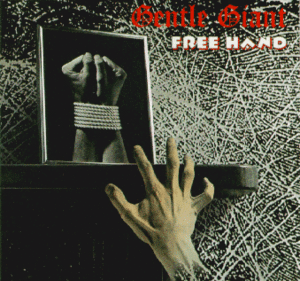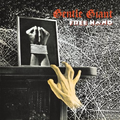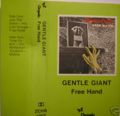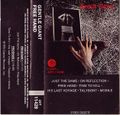Free Hand
For other uses of "Free Hand", see Free Hand (disambiguation).

|
| ||||||||||||
About the Album
One of Gentle Giant's finest albums, Free Hand is much influenced by the music of the Renaissance and Middle Ages.
We have photos of other versions of the album:
-
Alternative cover with hand in a different position.
-
Chrysalis cassette
-
Capitol cassette
-
Capitol close-up
-
Promo LP from Japan
Musicians
Gary Green, Kerry Minnear, Derek Shulman, Ray Shulman, and John Weathers. No instrument credits are listed on the album.
Other liner notes:
All selections composed by Ray Shulman, Derek Shulman and Kerry Minnear All selections published by Gentle Giant Music (Controlled in USA and Canada by Moth Music Corp.) BMI Recorded at Advision Studios, London, April '75 Engineer: Gary Martin assisted by Paul Northfield Cover design by Gentle Giant Graphics by Richard Evans A Gentle Giant Production
Track List
- Just The Same (5:34)
- On Reflection (5:41)
- Free Hand (6:14)
- Time To Kill (5:08)
- His Last Voyage (6:27)
- Talybont (2:43)
- Mobile (5:05)
Lyrics
All lyrics reproduced with the permission of DRT Entertainment (USA) and Alucard Publishing, Ltd. (UK).
- submitted by Chris Hill
Just the Same
Lead vocals: Derek
See me, what I am, what I was, what I'll be, Hear me, understand that I'm not what you see Take this, take the man, middle term, common me Don't you see that I'm just doing what I want to do Nothing more and nothing less than you Read no thoughts I didn't think myself Just the same as anybody else Make me someone else, put me up on a stand. Something that I don't really want on my hands Use me, idolise all you can understand Don't you see that I'm just doing what I want to do Nothing more and nothing less than you Read no thoughts I didn't think myself Just the same as anybody else Change it, what you think, what you thought, what you say Look for something more than you sought yesterday. I don't want to be part of your life to-day. Don't you see that I'm just doing what I want to do Nothing more and nothing less than you Read no thoughts I didn't think myself Just the same as anybody else
On Reflection
For other uses of "On Reflection", see On Reflection (disambiguation).
Lead vocals: Derek, Ray, Kerry, Gary (vocal fugue, in order of appearance); Kerry (middle section)
In my way did I use you, do you think I really abused you On reflection now it doesn't matter: How can you say I made you need me more than anyone else Who can say it right now it's finished over: It's my act, it's my calling, I explained exactly the falling Different ways of life can never even: Be the same when you saw me, could you always take me the same way As I came and went I tried to remember you: Still you stay Tied in your way Changing times Watching the signs How: Could you see in me what you thought about all you want me to be Now: On reflection why should have I changed my ways for you All around all around Cry my sympathy's with you but I never lied to you all in all it seems it's just an experience: Placed my cards on the table told of everything I was able, Understanding still not anything different: Find another to lean on, start again for I should have long gone, on reflection now it's just an experience. Soon the pain will have ended, together never intended, as I come and go I'll try to remember you. Look back it's not your game, together just in name. I'll remember the good things how can you forget all the years that we shared in our way: Things were changing my life, taking your place in my life and our time drifting away: All around all around
Free Hand
Lead vocals: Derek, Kerry (middle section)
Who would believe me now that my hands are free, that my hands are free. I never thought it would ever come to me, ever come to me. Now that my life's my own, I leave you behind, leaving you behind. What ever made you think that I'd change my mind, that I'd change my mind. It wasn't hard to run, break away from you, break away from you, After all you'd done, what was I to do, what was I to do. Who's gonna take my place in the games you play, in the games you play. Nobody's listening now to the things you say, all the things you say. Now my hands are free from the ties, from the ties. Now I look forward to the future, where it lies. And with you, feeling low, looking black Here, now my head is clear, why should I look back. When it was over did you have regrets, did you have regrets. Or did you really think it was over yet, it was over yet. Now that my life's my own I leave you behind, leaving you behind. What ever made you think that I'd change my mind, change my mind. Change my mind. Change my mind.
Time to Kill
Lead vocals: Derek; Kerry ("And with no questions then..."). NOTE: On the second One Way release of Free Hand, Derek sings Kerry's part.
Rests where he's staying, nowhere he knows, A place where nobody cares where he's straying or where he goes. To find no-one in particular, footloose, adventure still, No thoughts for reasons, he does all he's doing Has time to kill and still he's killing the time. Sundowner, drifting from place to place, Where all he needs is the shelter from seasons he was to face, No bounds or duties are his, never seeking to find an end. For life goes on being life, time and fortune he needs no Friends and yet he's killing the time. Where does he come from what did he do, You know the answers are his hopes and promises nothing new With no regrets he goes on doing nothing. Himself alone, but still he finds all the time isn't wasted, His life his own and yet he's killing the time. And with no questions then he finds his way Tomorrow never dawn only today. Content within his time just drifts away He finds his way He finds his way
His Last Voyage
Lead vocals: Kerry
Rose in early morning, as the light came through, Searching in the ocean, did what he should do, Seeking not adventure, just a way of life, Sky above turned grey, wind cut like a knife. This was his last voyage, this was his last time. Pulling up the anchor, letting go the rope, Age rules over all things, fate rules over hope. Then as bow was broken, water soon to rise, For they would have nothing, Nature's trust unwise, Through his boat and fortune, not for him that day, If he went to God, for him they would pray, As the tempest thundered, as the storm broke free, Suddenly in darkness, fear there none to see, Visions in his memory, what was meant to be, When the storm was over, nothing could be seen, Life and boat were taken, God knows what it means. Rose in early morning, as the light came through, Searching in the ocean, did what he should do, This was his last voyage, this was his last time. Pulling up the anchor, letting go the rope, Age rules over all things, fate rules over hope.
Talybont
Instrumental
Mobile
Lead vocals: Derek
Up, up, time to fly. Moving all around, going everywhere from town to town, All looking the same, changing only in name, Days turn into nights, time is nothing only if it's right, From where you came don't you think it's a game. No, no, don't ask why. Do it as you're told, you're the packet, do it as you're sold To all your friends, none for you at the end, Give them all you can, finish stronger than when you first began, You never pretend, all for you at the end. Time, time, say goodbye. To another place, hoping that you're seeing what you chase, All things as they should, always thought that they would, So you're racing ahead, home is just your shelter and your bed You do all you could, yesterday not as good. There are no hours, there are no seasons, Only the present, choice is the reason. Up, up, time to fly. Moving all around, going everywhere from town to town, All looking the same, changing only in name, Days turn into nights, time is nothing only if it's right, From where you came, it's you who's taking the blame Give them all you can, finish stronger than when you first began, You take the acclaim, don't you think it's a game.
Liner notes
These liner notes are reproduced with the kind permission of the Terrapin Trucking (UK) Ltd. Transcribed by Seong-Woo Kim.
Originally released in September 1975, Free Hand was Gentle Giant's seventh album, and their first for the Chrysalis label. Their move to Chrysalis followed a brief and less than satisfactory spell with Phonogram subsidiary World Wide Artists. Although their eighteen months with WWA had seen the release of two excellent albums, In A Glass House (1973) and The Power And The Glory (1974), both of which had done much to enhance the band's reputation, the relationship had quickly soured. It was with a profound sense of relief, and at considerable expense, that Giant finally extricated themselves from their contract and moved on.
Giant had supported Chrysalis stalwarts Jethro Tull on a European tour some years earlier, and had been impressed both by Tull's music and by label boss Terry Ellis. "We really liked them as a band", keyboardist Kerry Minnear later revealed, "and basically they were about the only real friends we made on the road. It was through this relationship, and getting to know Terry, that the eventual move to Chrysalis came about." Once released by WWA, Giant approached Ellis, sensing a sympathetic ear. A deal was quickly finalised.
Inevitably, these unsettling events made their mark on Giant's music. Throughout their later years, Gentle Giant albums featured many songs which dealt with all aspects of life as rock musicians, and not surprisingly Free Hand has more than most. The title track is a defiant parting shot at WWA, and an expression of the optimism which swept through the band once their problems were resolved. Mobile looks at the uncertainty and insecurity of life on the road, whilst Just The Same concerns itself with the pretentiousness of the music business, and the frustrations of being regarded as something other than you are simply because you become famous. Even On Reflection, an apparently personal account of a failed relationship, could be re-interpreted in the light of the group's recent difficulties.
Putting their troubles behind them, Gentle Giant embarked on extensive tours of North America and Europe, plus a short tour of the UK, to promote the release. Within six months they had recorded a follow-up, Interview, which was again the focus of hectic promotional activity. Looking back on this period early in 1977, vocalist Derek Shulman remarked "Terry made us work, and the whole buzz of playing live came back. We started talking again, enthusing as we had done before Octopus, (their fourth album, recorded late in 1972). The live recordings made during the band's 1976 European tour, released early the following year on the double album Playing The Fool, bear witness to Giant's new-found inspiration.
Free Hand was to become their most successful effort; in America it peaked at No. 48, their best placing in a run of chart albums which stretched from Octopus in 1973 to The Missing Piece in 1977. In Britain, where their following remained fiercely loyal but relatively small, Free Hand made a fleeting appearance in the lower reaches of some album charts, the only one of their twelve albums to do so. Their new label's publicity drive, some favourable airplay, and the attention of one or two rock journalists (most notably Phil Sutcliffe of 'Sounds') all helped, but in retrospect the album's success was well-deserved on its own merits. It was, perhaps, more commercial than previous releases, but still had the complexity and polish fans had come to expect.
The incredible range of Gentle Giant's music is evident throughout. From the intricate vocal fretwork of On Reflection and the delicate medieval flavour of Talybont to the Celtic-tinged rock of Time To Kill and the jagged rhythms of Just The Same, all those diverse elements which made the band so strikingly original are skillfully blended and perfectly executed.
Another opportunity to compare the new material with earlier efforts came with the release of Giant Steps - The First Five Years, a Phonogram retrospective issued late in 1975. Drawing from all six previous albums, this collection demonstrated that these elements had all been present in Giant's music from the outset, but never before had they been brought together so convincingly.
Free Hand is the only one of Gentle Giant's Chrysalis-period studio albums which has previously been available on CD, and then only in the States. Now, along with the other four - Interview, The Missing Piece, Giant For A Day and Civilian - it is being given a long-overdue British CD release. The band's music, with its tonal range and painstaking attention to sound quality, was made for CD. Free Hand sounds as fresh today as it did on first release, a fitting tribute to the compositional skills and expertise of five dedicated musicians.
- Alan Kinsman. Many thanks for their assistance to Kerry Minnear and Ray Shulman.
Cool stuff in the music
- During the verses of Just The Same, the bass and drums are playing in 6/4 while the piano, voice, and guitar are playing in 7/4. (Thanks to Don Tillman.)
- The first section of On Reflection is a four-part vocal fugue. The last section is the same fugue played on instruments.
- In On Reflection, the last entrance of the band is accompanied by a springy wavering of the pitch (most noticeable in the electric guitar), which is likely the sound of the 24 track tape machine being dropped into "Vari Speed" mode, and the entire end section is transposed (sped up really) by a half step. Both the Studer and the Ampex tape machines, which were popular at the time of Free Hand, make this distinctive noise when you drop them into varispeed. (Thanks to Kevin Gilbert.)
- The bass part at the very beginning of Free Hand is repeated, in a different rhythm and tempo, when the "waltz" section begins (3:55 into the song). (Thanks to Daniel Cadieux.) In fact, the whole waltz section contains various themes from earlier in the song. (Thanks to Remmert Velthuis.)
- The opening melody of On Reflection and the middle ballad section have almost identical melodies. Compare "In my way did I use you, do you think I really abused you" to "I remember the good things how can you forget." (Thanks to Alex Temple.)
- The opening melody of Talybont is a heavily disguised reworking of the vocal melody of Just The Same. (Thanks to Kevin Ward.)
- Talybont is a small hamlet in Wales near to where John Weathers lived. (Thanks to Jeff Oliver and Derek Shulman.)
- Talybont was recorded as the theme song for a movie about Robin Hood. The movie was never released, but it reportedly had "quite well known players in the movie business." If the movie had gone ahead, Gentle Giant would have recorded more material for it. (Thanks to Derek Shulman.) Actually, some of that music did get recorded and appears on Under Construction.
- The electronic sounds at the beginning of Time To Kill are from the old videogame, "Pong." And if you listen closely, you can hear one of the guys whisper "go" just before the loud buzz which indicates a goal scored. (Thanks to George Seaman.)
- The middle of His Last Voyage is a three-part vocal canon. (Thanks to Mike Beauvois.)
- The bass riff in the introduction of His Last Voyage fits over the very classic rock chord progression: I, bVII, bVI, V. (Thanks to Greg Hajic.)
Music files
MIDI files
| MIDI File | Title | Album | Contributor |
|---|---|---|---|
| Freehand-rasten.mid | Free Hand (song) | Free Hand | Fredrik Rasten |
| Onreflection.mid | On Reflection | Free Hand | Claude Chamberland |
| Onreflection2.mid | On Reflection | Free Hand | Kevin Greene |
| Freehand.mid | Free Hand (song) | Free Hand | Dave White |
| Onreflection-geise.mid | On Reflection | Free Hand | Gordon Geise |
| Talybont.mid | Talybont | Free Hand | Russ Wood |
| Jtsame.mid | Just The Same | Free Hand | Dave White |
Sheet music
CD releases
This list is out of date.
| Country | Label Information |
|---|---|
| USA | One Way Records, CDL-57338. "AM6/CDL-57338" is printed on the inner rim of the disc. (Out of print and recalled due to poor quality) |
| USA | One Way Records, CDL-57338. "ESK<010>CDL57338" is printed on the inner rim of the disc. Fans report that some discs are labeled 57388, 01<block> 94, and either 1 1-1-2 EMI JAX, 1-1-3 EMI JAX, 1-1-4 EMI JAX, or 1-1-5 EMI JAX." |
| UK | Terrapin Trucking/Road Goes On Forever, RGF CD 1004 (Remastered as TRUCKCD 004) (Out of print) |
| UK | BGO (Free Hand & In'terview) |
| USA | DRT Entertainment |
Alternate master tape
The second One Way release has much better sound than the first, but it was created from a very unusual master tape. Rich Goodhart reports the tape "is a quickly made rough mix tape of the finished multi-tracks, never intended to be a master tape and shouldn't even be thought of as one. How One Way got ahold of it is a mystery to me, though I am glad they did for the alternate view." Some of the instrumental and vocal parts are different from those of the original album!
- Some of the lines in "Time To Kill" are sung by Derek Shulman instead of Kerry Minnear; for example, "And with no questions then, he finds his way."
- The drums in "On Reflection" enter half a verse earlier than in the original.
- And worst of all, at the climax of "On Reflection," when the full band comes CRASHING in, the drums are barely audible!
In addition, there are a few extra measures on the guitar/drum break of "Just the Same." Finally, if you have a good stereo system, you can hear some background noise like lip smacks and breathing. Details on this master tape can be found in issue 3 of Proclamation magazine.
Defects
The first One Way release has terrible sound quality. It is very muddy and lacks treble. Supposedly, it was not mastered from an original master tape. After complaints from listeners, One Way recalled the disc from stores, remastered the disc, and rereleased it.
Both One Way discs used incorrect or poorly chosen master tapes. Both One Way discs incorrectly say that the album was made in 1972.
The second One Way disc is missing the drum roll at the very end of the album.
Reviews
- Free Hand review from Keyboard Magazine
- Free Hand review by Chris (German)
- Free Hand review by Ian McGrath
- Free Hand review by Jason Rubin
- George Starostin review




